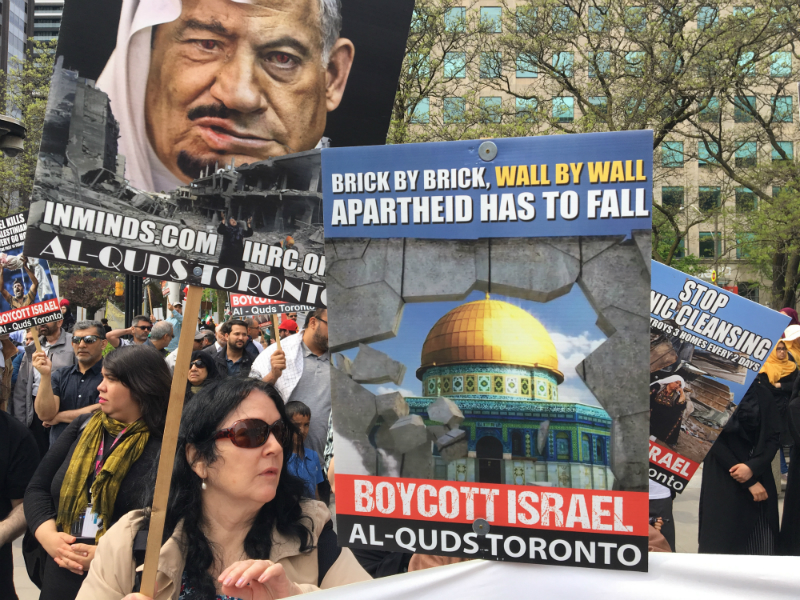The Al-Quds Day rally is set to return to the streets of downtown Toronto on Saturday, April 30, after two years of taking place online.
A day earlier, police chief James Ramer told a press conference that his force is taking extra steps to ensure the event remains lawful and peaceful—and they will investigate and arrest anyone whose behaviour crosses the line into criminality.
Al-Quds Day, held on the last Friday of Ramadan, was first started in 1979 by Iran as a way to promote the Palestinian cause and oppose Zionism and Israel. In the past, the Toronto rallies have had antisemitic rhetoric and images, and occasionally led to clashes between attendees at the rally and counter-protesters.
This year’s rally is scheduled to take place outside Toronto’s University Avenue courthouse.
Even though hateful displays occurred at previous rallies, Ramer said the police were still obligated to permit the rally to continue, as it is their duty to respect and facilitate individuals’ charter rights to freedom of protest—so long as that protest is lawful and peaceful. The chief said the police are taking a number of steps to both ensure the protest remains such the day of the event, and to follow up on any potentially criminal behaviour after the fact.
“What we will not tolerate is civil disobedience, violence or hateful behaviour that crosses the line into criminality,” said Ramer. “Anyone whose behaviour crosses the line from lawful demonstration to criminality should expect to be arrested. This has been my message and will continue to be my message.
“In addition to a visible frontline officer presence, we will also have officers from our dedicated hate crime unit on the ground to be able to immediately gather evidence to investigate any suspected hate crimes or hate speech or signage.”
The police will also be bringing cameras to the event to facilitate in later investigations, and officers who speak a number of languages to help the police stay aware of what is occurring at the rally.
“We’re doing it more and more,” Ramer said of utilizing officers who speak different languages. “Having the officer with that cultural background, and understanding that language, gives us a much better idea of exactly what’s happening in some of these events and may enable us to prevent something from occurring, or prevent some violence.”
Mayor John Tory expressed his support for the police’s strategy in a statement shortly after Ramer’s press conference.
“I support the charter and its guarantees of the right to free speech and free assembly,” Tory wrote. “However, as a city, we cannot accept any instances of discrimination, hate speech or incitement to violence that takes place at the expense of other people’s safety. I have repeatedly condemned any and all forms of hate speech and I have been clear that I cannot accept hatred or violence against any group of people.”
Toronto city councillor James Pasternak, of Ward 6, York Centre, has long been opposing hateful rallies such as Al-Quds. He was a driving force behind the sweeping measures the city passed in 2019 to curb hate-sponsored rallies on its property.
Pasternak feels that the escalating hatefulness and criminality of the rally has not been taken seriously enough, and is calling on city staff to do more.
“These gatherings have gotten worse over the years. They’re calling for the harming and killing of Jews. They are targeting an identifiable group. And city staff have not implemented this hate rally policy that we had hoped they would. So we are going to continue to force the issue at city hall and do everything we can,” he said.
Pasternak appreciates the difficult position the police are in—trying to enforce the law while also de-escalating the situation. But he said it’s still important to monitor the situation so that later follow-up is possible. He cited the Jan. 6, 2021 riots at the United States Capitol, saying that over 700 people were arrested after the fact based on information gathered at the time and photos and videos of the riots.
“As long as there are no consequences for these hate gatherings, they’ll continue and they’ll get worse. And that’s a real danger to Toronto and the Jewish community,” Pasternak said. “The other thing is, if this is allowed to go on, then they’re going to start targeting other groups as well. Groups like this don’t just hate the Jewish community, they hate all the communities, and this will explode out of control. And the time to contain it and respond to it is now.”
Jewish advocacy groups have also long been expressing concern about Toronto’s Al-Quds Day rally. Michael Mostyn, CEO of B’nai Brith Canada, says the organization has tried every possible avenue to shut down the rally.
“We’ve made criminal complaints. We’ve complained to the city. We’ve complained to the province in the past. The City of Berlin no longer permits Al-Quds Day to take place in its city for that very same reason, because this is a hateful event,” he said.
“When you get down to it, it turns into an inciting event against Jews. And when you see that Jews are the most victimized group on the raw numbers in Canada, no country should want to allow for inciting events to take place because it just leads to growing trend lines of that very same victimized group being victimized further and further.”
Noah Shack, vice-president of the Centre for Israel and Jewish Affairs, shares Mostyn’s concerns about Al-Quds Day. He wants civic leaders to send a “clear and unequivocal message” that hate has no place in Toronto. Shack understands people have a right to protest peacefully and lawfully, but is not optimistic about those prospects.
“Unfortunately, there is an established pattern of Al-Quds Day protests turning vicious and ugly. And while I hope that isn’t the case this year, there’s no sign to indicate that that’s going to be what happens,” he said.
“It looks like it’s going to be another one where we will hear some very ugly things said about our people, about our community, vicious things that all too often fuel violence against Jews and Israelis all around the world.”







